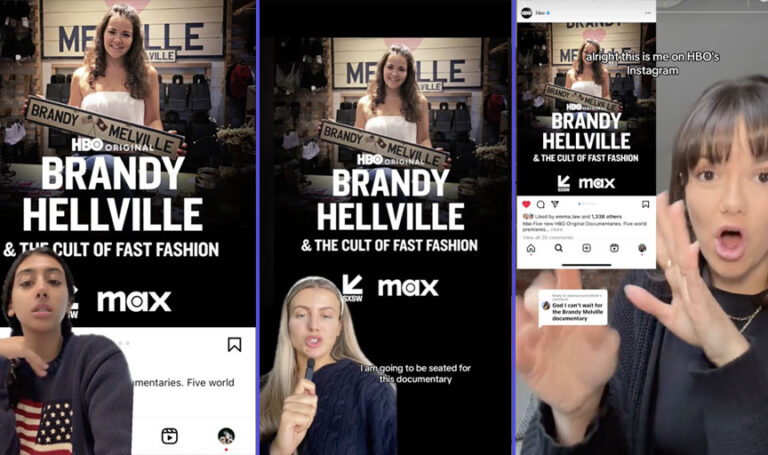New HBO documentary Brandy Hellville & The Cult Of Fast Fashion set to expose Brandy Melville
HBO is about to drop a bombshell with its latest documentary, Brandy Helville & The Cult of Fast Fashion. Although the exact release date for this exposé hasn’t been confirmed yet, its IMDb page suggests it might be dropping today, Monday 11 March 2024.
The documentary is set to peel back the layers, exposing the disconcerting practices of Brandy Melville and the many instances that have likely played a part in building the brand’s controversial reputation.
@nmillz1 ♬ original sound - Noah Miller
Ask anyone who came of age in the 2010s, and they can vividly recount the experience of being inside a Brandy Melville store. The unmistakable fragrance, hangers adorned with fabric remnants, subdued florals, lace trims, and an inherent sense of inadequacy compared to the store’s staff, all defined the atmosphere. During this era, the prevailing aesthetic glorified the effortlessly cool and slender, blonde ‘surfer girl’—aka no-one who weighed over 40 kilos.
Brandy Melville stores are most infamous for their “one size fits most” clothing—as you can probably already guess, one size does not fit most. The brand supposedly carries sizes small, medium and large for its denim range, but upon checking its website, six of the 26 listings had sizes small and medium, while every other pair of jeans is only made in a size small.
Throughout the years, this infamous store has been criticised for cultivating what some people perceive as a cult-like following. Accusations have been made that the brand deliberately excludes certain individuals based on their race and body weight. Despite this controversy, a distinct girl archetype has emerged as a byproduct, shaping a particular image associated with the brand, the “Brandy girl.”
For those of you who’ve never heard of the term, the Brandy girl never had an issue fitting into the store’s one-size clothing, her hair never got frizzy at her beach photoshoots, and she made you want to spend $20 on a plain white tank top just for the chance to look like her, or more accurately, to feel like her…
While body ideals may have changed from the gaunt figure of the nineties and early aughts to an equally unachievable curvaceous, Kardashian-esque figure, Brandy Melville continues to aid in the perpetuation of this exclusivity. What it sells is not just clothing, but a lifestyle, a sort of club membership, and from its marketing, it is clear that to be a Brandy girl you must be tall, white, skinny, upper-middle class and able-bodied.
According to a recent report from Business Insider, the situation at Brandy Melville was more troubling than initially believed. Executives were reportedly requesting full-body photos from sales associates, some of whom were high school students.
Former senior vice president Luca Rotondo told Insider that CEO Stephan Marsan had discriminatory preferences, expressing a desire to exclude individuals who were Black or considered overweight. Rotondo, who spent nearly a decade at Brandy Melville, claimed he was directed to terminate “hundreds” of employees.
He provided an example, sharing a screenshot of Marsan criticising a manager in Newport Beach, California, with dark hair. Marsan allegedly stated in Italian that the location was “only hiring pieces of shit” and that such hires would tarnish the carefully cultivated image of Brandy Melville: white, thin, and blonde.
Reporter Kate Taylor details an incident where Marsan allegedly used Photoshop to superimpose his face onto Adolf Hitler’s body in a group chat with executives, which also reportedly contained pornography, the N word, and more. Additionally, two separate legal cases resulted in Canadian store owners being terminated for refusing to comply with Marsan’s directive to dismiss employees who did not align with his all-white, all-thin standards.
However, Bastiat USA, the company overseeing Brandy Melville’s US stores (comprising 34 of the label’s 94 locations), refuted any claims of racial-based terminations, asserting it has never fired an employee due to their race. Notably, Marsan has yet to grant an interview.
I don’t know what’s more shocking- a Nazi baby tee or the fact it has NINE THOUSAND LIKES
byu/sexylev inDepop
The current wave of retrospection surrounding brands like Brandy Melville is riding on the crest of growing societal awareness regarding the ethical pitfalls of fast fashion. Think Lululemon and Abercrombie—big names that faced the music for their questionable marketing tactics. Now, the magnifying glass on fashion brands is sharper than ever. Consumers are turning the spotlight on companies perpetuating harmful beauty standards and exclusionary practices, loudly demanding transparency and accountability.
As netizens spill their guts online, there is a growing curiosity to unravel the dark secrets lurking behind the curtain of Brandy Melville. The anticipation of the upcoming documentary is palpable, as it promises to lift the veil on the unsettling realities and controversies surrounding the fashion giant.






